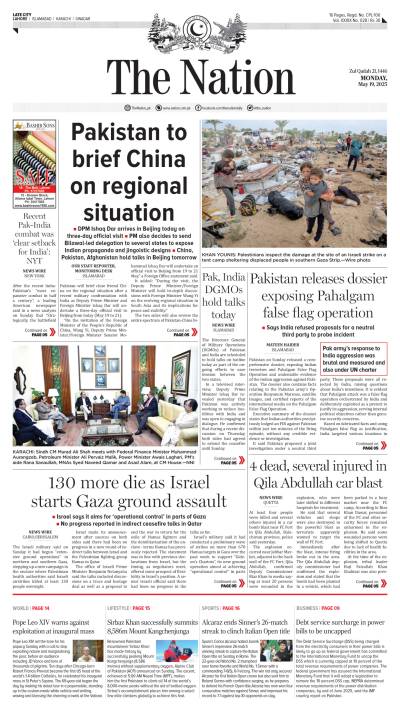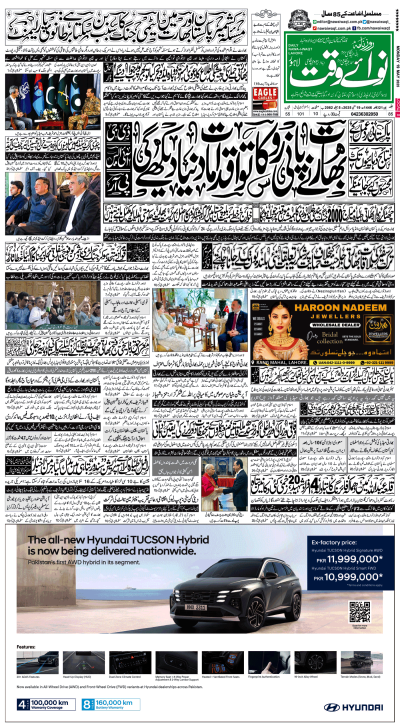ISLAMABAD - Impressed by Pakistan Peoples Party (PPP) Chairman Bilawal Bhutto Zardari’s defence of Pakistan’s narrative during and after the military confrontation with India, Prime Minister Shehbaz Sharif preferred Bilawal over Deputy Prime Minister Ishaq Dar to lead the diplomatic offensive at the global stage – especially in the West.
DPM Dar, who also serves as the Foreign Minister, remained in touch with his counterparts across the world during the high-tension days and will leave for China today (May 19) to brief the friendly neighbour. Top government aides said Bilawal had performed well during the conflict and successfully defended Pakistan’s position. “This is why the PM wanted him as the FM when the coalition government was formed. Bilawal refused that role but the PM still thinks he has this special talent,” a cabinet member said.
He clarified that the PM also acknowledges the performance of Ishaq Dar during the episode. “We have now entered a new phase. Hopefully Bilawal will come up to the expectations. He (Bilawal) is more acceptable in the western world. Ishaq Dar is not out of the picture,” the minister said. This strategic move marks a significant recalibration in Islamabad’s foreign policy approach, reflecting both the gravity of the situation and the political consensus around Bilawal’s capability to articulate Pakistan’s narrative in critical international arenas.
Following weeks of heightened military brinkmanship along the Line of Control (LoC) and across broader regional fault lines, Prime Minister Shehbaz Sharif personally reached out to Bilawal, formally requesting him to lead a high-level peace delegation to Europe and the United States. The move underscores Pakistan’s effort to counter India’s intensified diplomatic outreach and narrative-building efforts in Western capitals after the April 22 Pahalgam attack, which claimed 26 civilian lives and reignited hostilities between the two nuclear-armed neighbours. The Pakistani government has since constituted a Special Diplomatic Committee under Bilawal’s leadership. Comprising seasoned diplomats and political heavyweights including federal ministers Khurram Dastgir, Dr Musadik Malik, former Foreign Minister Hina Rabbani Khar, former foreign secretary Jalil Abbas Jilani, PPP leader Sherry Rehman, Senator Faisal Subzwari, and former foreign secretary Tehmina Janjua, the committee aims to coordinate Pakistan’s response, promote regional peace, and neutralize what Islamabad sees as a concerted Indian campaign of misinformation. The high-profile delegation led by Bilawal is expected to engage with European Union institutions and major European capitals to raise awareness about India’s “provocative and unilateral actions,” including the suspension of the Indus Waters Treaty, alleged ceasefire violations, and growing human rights concerns in occupied Kashmir.
Bilawal, confirming the assignment through his official X account, said: “I was contacted earlier today by Prime Minister Shehbaz, who requested that I lead a delegation to present Pakistan’s case for peace on the international stage. I am honoured to accept this responsibility and remain committed to serving Pakistan in these challenging times. Pakistan Zindabad (love live Pakistan).” The offensive is not limited to Europe and the US. Additional diplomatic delegations are being dispatched to key power centers including Moscow and Beijing. A team led by veteran diplomat and special assistant Tariq Fatemi will travel to Russia to consult with Kremlin officials and bolster Pakistan’s narrative. The diplomatic mobilization is being viewed as a direct counter to New Delhi’s own diplomatic blitz, initiated in the aftermath of the Pahalgam tragedy, which India alleges was orchestrated by Pakistan-based militant outfits. Pakistan has categorically denied any involvement, calling the allegations “baseless provocations” intended to justify India’s aggressive military and policy manoeuvres. The situation remains delicate. Though a US-brokered ceasefire halted open hostilities on May 10, Indian Prime Minister Narendra Modi’s subsequent statement, asserting that India has merely “paused” its response and retains the right to retaliate “on its own terms,” has further intensified anxiety across the region.
Also, India’s unilateral suspension of the Indus Waters Treaty, a cornerstone of regional water-sharing cooperation since 1960, has added a new layer of urgency to Islamabad’s outreach. Pakistan, a downstream nation, views the move as a potential violation of international law and a direct threat to its national security, food sovereignty, and water access. Beyond presenting a rebuttal to India’s actions, Islamabad’s diplomatic surge is aimed at repositioning Pakistan on the global stage, as a rational actor advocating peace, in contrast to what it frames as India’s increasing belligerence. The effort is also a domestic political calculation. The appointment of Bilawal, whose tenure as Foreign Minister in 2022-23 earned praise for deft multilateral engagement, signals a consensus within Pakistan’s power corridors to entrust this crucial mission to a younger, internationally palatable face.
While the ceasefire has held so far, recent events suggest the current peace is tenuous at best. Cross-border skirmishes had already surpassed the total number of ceasefire violations recorded in 2023 and 2024 combined, even before the Pahalgam attack.
Whether Pakistan’s diplomatic push can effectively counter Indian narratives and prevent future escalation will depend not only on the skill of the envoys, but also on the international community’s appetite for active mediation.






